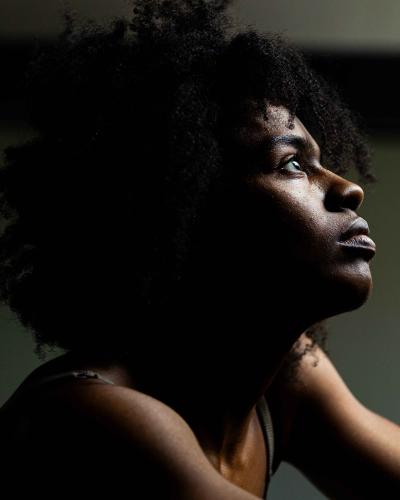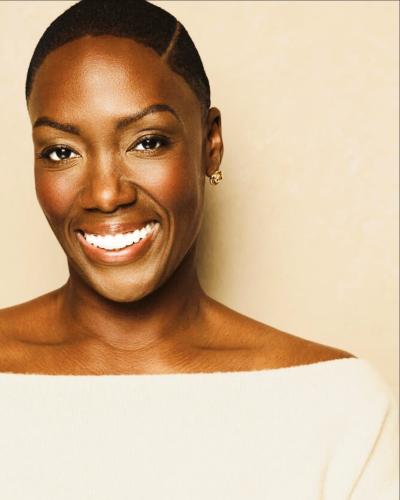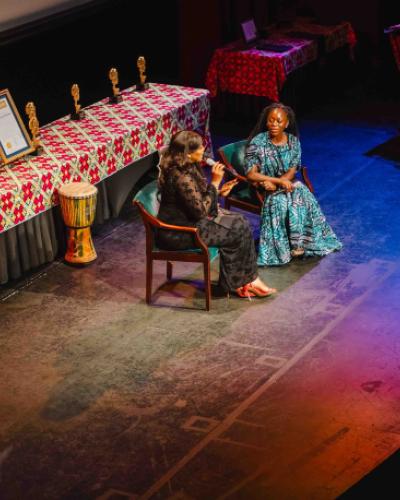Rejoice Abutsa, a Ph.D. candidate in Performing and Media Arts, moderated a fireside chat with Nollywood icon Omotola Jalade-Ekeinde at the Silicon Valley African Film Festival (SVAFF) in San Jose, California. A day after the premiere of Jalade-Ekeinde’s directorial debut feature film, Mother’s Love, the actress/filmmaker was conferred the Trailblazer Award during the festival’s closing night ceremony. As she took to the stage, Abutsa was invited to moderate a fireside chat which explored the actress/filmmaker's career, the evolution of African cinema, and the global impact of Nollywood. In an article published by The Guardian, Nigeria’s independent newspaper, Segun Akinleye writes that the significant exchange between the two “radiated creative galaxies.”
In another comment, Professor Jude Akudinobi, Chairman, SVAFF International Advisory Board, and faculty member at UC Santa Barbara, with a background in Cinema and Media, present throughout the festival, described the fireside chat as, “Lively and engaging... The conversations between Jalade-Ekeinde (practitioner/celebrity) and Abutsa (scholar/anchor), in exquisitely exploring the complex intersections of art and activism, especially, film and feminism, through eye-opening subtleties of African female filmmaking, offered much-needed scopes that resonated robustly with the diverse audience.”
Reflecting more, on the occasion’s significance, he remarked: “It merits underscoring that the Silicon Valley African Film Festival (SVAFF) is not a mere platform to showcase African cinema but, in providing a wealth of reference points and creative expressions, enriches global understanding of Africa beyond the ephemeral, mythic and enigmatic.”
Abutsa took some time to speak with us about the film and the fireside chat:
“I enjoyed Omotola Jalade-Ekeinde’s Mother’s Love for its earnest use of humor (a critical attribute of Nollywood storytelling),” said Abutsa. “Additionally, Mother's Love captures the tensions of motherhood and foregrounds the emotional labor that is often overlooked as women navigate and negotiate the cultural expectations attached to parenting. Its narrative subtly challenges conventional representations of motherhood, challenging stereotypes, highlighting the complexities, and the quiet strength embedded in the maternal role. It drove home ideas about the politics of motherhood on multiple levels.
Crucially, Omotola’s character was mothering a female child, a partner, and an economically disadvantaged community. As I see it, the narrative draws on an African/Black Womanist framework and engages the concept of Nego-feminism as expounded by Obioma Nnaemeka, a remarkable African scholar and feminist. As a scholar, I found its ability to bring these theories and ideas to life deeply fascinating.”
What did moderating this conversation mean to you?
“I grew up watching Omotola Jalade-Ekeinde on television. Like I told her on stage, she is critical to the story of Nollywood. Ije: The Journey, a film central to the argument I make in my dissertation and one that occupies a significant portion of it, features her in the lead role. I have reviewed her work in other forums and have been deeply inspired by her experience beyond the often-celebrated acting roles she has played over the years. She holds a unique place in African popular memory. She is an actress, a singer, a philanthropist, a reality show star, and was recognized on TIME Magazine's 100 Most Influential People list.
Another aspect of my dissertation research examines the enormous work that women like Jalade-Ekeinde perform, such as joining international delegations to seek and advocate for improved structures for Nollywood in ways that enable new spheres for its renaissance. On stage, she eloquently described Nollywood's pioneering status and history, tracking how it achieved international reach even before the rise of Afrobeats. Continuing, she reminded the audience that Nollywood laid much of the groundwork and developed features that have made it of interest to Netflix, other global streaming platforms, and international audiences.
The momentous engagement with Omotola Jalade-Ekeinde on stage stands out as a cogent and timely reminder of the often-overlooked histories embedded within the lives of African film practitioners, especially African female filmmakers, who are frequently relegated to the margins of critical thought, irrespective of their remarkable contributions to film and cultural production industries.”
Can you share a memorable moment from your conversation?
“One of the standout moments was when I asked her if there is any historical figure she would like to portray. Without hesitation, she named Funmilayo Ransome-Kuti, a choice that revealed the actress’s deep resonance with women who have defied the status quo. Ransome-Kuti, often remembered in popular memory as the first Nigerian woman to drive a car, was in fact a pioneering activist and visionary who dismantled class barriers by mobilizing women against labor exploitation, financial exploitation, and their marginal status in public life. Jalade-Ekeinde recognized in her a figure whose radical legacy, anchored in foresightedness, could be magnificently translated on screen.
Beyond admiration, the connection speaks to Jalade-Ekeinde’s own longstanding commitment to structural changes in Nollywood. Like Ransome-Kuti, she consistently works to eliminate the enduring problematic practices of Nollywood from its founding era. She uses her platform to advocate for residuals and royalties for Nigerian actors. Given her commitments, relentlessly, she has been part of international delegations, leveraging transnational networks for Nollywood’s infrastructural improvements and innovation. Some of these elements feature in my dissertation, and I was excited that she touched on them.”
Read more about Abutsa’s work.
Read the article “Filmmaker meets film scholar: Omotola Jalade-Ekeinde in conversation with Rejoice Abutsa” in The Guardian.
Read more about the Silicon Valley African Film Festival.
Photo credit: ASHA Weal for R.I.C.E. Media





